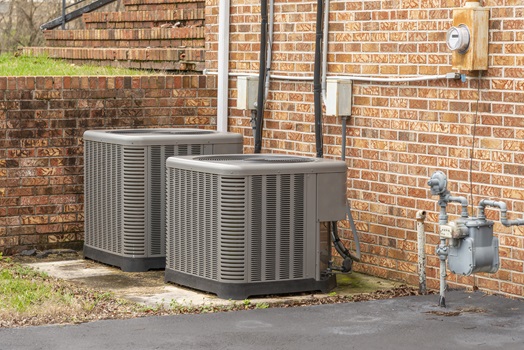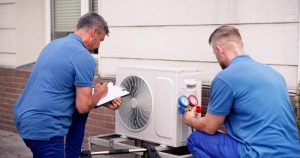
An HVAC system is a significant investment that plays a vital role in keeping your home comfortable. Typically, most HVAC systems have a lifespan of 15 to 25 years; however, this can vary based on the type of system, how it’s maintained, and other contributing factors.
Even with routine care, every HVAC system will eventually need replacement. To help you plan and maintain your system, let’s look at typical life spans, factors that impact longevity, and tips to maximize your HVAC system’s performance.
Expected Life Spans of Different HVAC Systems
Understanding how long different HVAC systems typically last can help set realistic expectations. Here are some common HVAC components and their usual life spans:
Furnaces: Generally, gas furnaces can last 20 to 30 years when properly maintained. On the other hand, poorly maintained units or those of lower quality may only last around 10 years. Oil furnaces usually have a shorter lifespan, about 10 to 15 years, due to the additional upkeep they require.
Boilers: Boilers often last a bit longer than furnaces, typically 20 to 35 years. However, they are often replaced when the heat exchanger starts to leak or when major repairs become more frequent.
Air Conditioners: Air conditioners generally last between 15 and 20 years. However, in areas prone to salt exposure, such as coastal regions, their lifespan can be shorter, around 7 to 12 years. Many air conditioners are replaced when the compressor fails or significant corrosion occurs in the condenser.
Heat Pumps: The lifespan of heat pumps can range from 10 to 20 years, with 15 being the average. Because they provide both heating and cooling, they tend to be used more often, which can shorten their life. In salty environments, heat pumps may only last 7 to 12 years.
Ductless Mini–Splits: These units, like heat pumps, offer both heating and cooling and typically last between 10 and 30 years. However, similar to other systems, exposure to salt can reduce this lifespan.
While these are general expectations, many homeowners decide to replace their HVAC system sooner. As systems age, they often become less reliable and efficient, resulting in higher HVAC repair and utility costs. When a system reaches 10 to 15 years old, upgrading to a modern, energy-efficient model can often be a smart investment.
Factors That Impact the Longevity of HVAC Systems
The lifespan of an HVAC system is influenced by several factors. Understanding these can help you maintain your system more effectively and identify when it may be time for a replacement.
Quality of Maintenance: Regular and thorough maintenance is essential for keeping your HVAC system running smoothly. Without it, components can wear out faster, leading to early system failure.
Initial System Quality: High-quality HVAC systems are generally built to last longer. Investing in a reliable system upfront can pay off in the long run.
Correct Sizing: An HVAC system that is too large or too small for a space can experience issues. An oversized unit may cycle on and off frequently, leading to wear, while an undersized system may struggle to maintain comfort, wearing out components faster.
Installation Practices: A properly installed system runs efficiently and lasts longer. Poor installation can lead to issues that affect the system’s performance and longevity.
Usage Levels: Systems that are used heavily or run in extreme settings may have shorter life spans. On the other hand, moderate use can help extend the life of your system.
Environmental Factors: If your system is located in a coastal area or an environment with high salt content, corrosion can develop more quickly. This can significantly shorten the life of components like condensers.
Out of these factors, poor maintenance and incorrect system sizing are some of the most detrimental. Regular check-ups and proper sizing can make a substantial difference in how long your system lasts.

HVAC inspection in Knoxville TN
Maintenance Tips for Extending the Life of Your HVAC System
Routine HVAC maintenance is one of the best ways to keep your HVAC system running efficiently for as long as possible. Here are some simple maintenance tips to help you extend the life of your system:
Change Filters Regularly: Dirty filters restrict airflow, causing your system to work harder than necessary. Replacing filters on a regular schedule helps the system function efficiently and prevents unnecessary wear on the motor.
Schedule Annual Inspections: An annual inspection can catch small issues before they become major problems. This includes checking for loose connections, worn parts, and early signs of rust or corrosion.
Clean the Outdoor Unit: For systems like air conditioners and heat pumps, it’s important to keep the outdoor unit clear of debris. Regularly removing leaves and dirt ensures better airflow and more efficient operation.
Check Thermostat Settings: Make sure your thermostat is calibrated correctly and set to operate at optimal levels. This helps prevent the system from overworking, extending its life.
Use Preventive Maintenance Plans: Consider enrolling in a preventive maintenance plan with an HVAC professional. These plans provide regular check-ups and tune-ups that can catch potential problems early and keep your system in top shape.
When to Seek Professional Help
Although regular maintenance can keep your HVAC system in good condition, certain situations require professional assistance. Here are some signs that it might be time to call an HVAC contractor in Knoxville TN:
- Recurring Electrical Issues: Frequent blown fuses or tripped circuit breakers indicate a deeper issue that needs professional attention.
- Unusual Noises or Smells: Strange sounds or burning smells can point to significant electrical or mechanical issues.
- Declining Performance: If your system struggles to maintain comfort even after maintenance, a professional assessment might reveal underlying issues.
- Multiple Failures: If several components malfunction at once, it could signal a larger system problem that requires expert troubleshooting.
Ready to Maximise Your HVAC System’s Lifespan?
Understanding the expected life span of HVAC components and practicing consistent maintenance are crucial for ensuring optimal performance. By following these tips and hiring J.C.’s Heating and Air, you can extend your system’s life, enhance energy efficiency, and save on future repair costs.
If you need expert advice or services for your HVAC system, call J.C.’s Heating and Air now to schedule an inspection or maintenance visit. Keep your system running efficiently and enjoy a comfortable home year-round!
Like our Facebook page for more great info about heating and cooling services.
J.C.’s Heating and Air
3709 N Broadway
Knoxville, TN 37917
865-388-1712
https://jcsheatingandair.com
